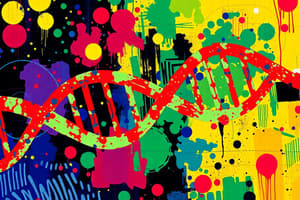Podcast
Questions and Answers
What is the primary focus of Crime Scene Investigation (CSI)?
What is the primary focus of Crime Scene Investigation (CSI)?
- Investigating digital data from devices
- Assessing psychological aspects of criminal behavior
- Examining evidence to reconstruct events at crime scenes (correct)
- Analyzing historical evidence related to forensic methods
What is the role of a forensic pathologist?
What is the role of a forensic pathologist?
- Performing autopsies to determine cause and manner of death (correct)
- Examining computer data for legal purposes
- Identifying and analyzing poisons found in the body
- Conducting psychological evaluations of suspects
What does toxicology specifically study in the context of forensic science?
What does toxicology specifically study in the context of forensic science?
- The effects and identification of poisons and drugs in the body (correct)
- The influence of insects on the decomposition process
- Past criminal behaviors using psychological analysis
- Chemical composition of substances to determine evidence
Forensic chemistry primarily utilizes which of the following methods?
Forensic chemistry primarily utilizes which of the following methods?
Digital forensics is primarily concerned with which type of evidence?
Digital forensics is primarily concerned with which type of evidence?
What is the primary focus of digital forensics?
What is the primary focus of digital forensics?
Which procedure is often involved in crime scene investigation?
Which procedure is often involved in crime scene investigation?
Forensic pathology is most concerned with what aspect related to death?
Forensic pathology is most concerned with what aspect related to death?
What is the main focus of toxicology in forensic science?
What is the main focus of toxicology in forensic science?
Forensic chemistry can be applied in which of the following scenarios?
Forensic chemistry can be applied in which of the following scenarios?
Which field examines the role of insects in determining the time of death?
Which field examines the role of insects in determining the time of death?
The identification of bodily fluids involves which of the following techniques?
The identification of bodily fluids involves which of the following techniques?
Which forensic discipline often assesses the psychological state of individuals involved in criminal activities?
Which forensic discipline often assesses the psychological state of individuals involved in criminal activities?
What type of analysis is included in techniques of DNA analysis?
What type of analysis is included in techniques of DNA analysis?
What is the purpose of understanding forensic history?
What is the purpose of understanding forensic history?
Flashcards
CSI
CSI
Analyzing crime scene evidence to reconstruct events.
Forensic Pathology
Forensic Pathology
Examining cause and manner of death through autopsies & body analysis.
Toxicology
Toxicology
Identifying and analyzing effects of poisons & drugs in the body.
Digital Forensics
Digital Forensics
Signup and view all the flashcards
Forensic Anthropology
Forensic Anthropology
Signup and view all the flashcards
Forensic Science Scope
Forensic Science Scope
Signup and view all the flashcards
Digital Forensics Purpose
Digital Forensics Purpose
Signup and view all the flashcards
Crime Scene Investigation Process
Crime Scene Investigation Process
Signup and view all the flashcards
Forensic Pathology Role
Forensic Pathology Role
Signup and view all the flashcards
Toxicology's Focus
Toxicology's Focus
Signup and view all the flashcards
Forensic Chemistry's Application
Forensic Chemistry's Application
Signup and view all the flashcards
Forensic Entomology's Study
Forensic Entomology's Study
Signup and view all the flashcards
Forensic Anthropology Focus
Forensic Anthropology Focus
Signup and view all the flashcards
Forensic Psychiatry and Psychology Role
Forensic Psychiatry and Psychology Role
Signup and view all the flashcards
DNA Analysis in Forensic Science
DNA Analysis in Forensic Science
Signup and view all the flashcards
Study Notes
Forensic Science Disciplines
- Forensic Science is a broad field encompassing various specializations.
- Crime Scene Investigation (CSI) involves analyzing evidence at crime scenes to reconstruct events.
- Forensic Pathology examines the cause and manner of death through autopsies and body analysis.
- Toxicology identifies and determines the effects of poisons and drugs in the body.
- Forensic Chemistry employs chemical analysis to identify and characterize substances.
- Digital Forensics focuses on investigating digital evidence from computers, phones, and other devices.
- Forensic History studies the historical development and application of forensic methods.
- Forensic Entomology uses insect activity to determine time of death.
- Forensic Anthropology applies skeletal analysis to identify individuals and determine past experiences.
- Forensic Psychiatry examines the psychological aspects of criminal behavior, and the validity of evidence in psychological terms.
- Forensic Psychology applies psychological principles to legal issues, such as competency evaluations.
Studying That Suits You
Use AI to generate personalized quizzes and flashcards to suit your learning preferences.
Description
Explore the diverse and specialized fields within forensic science. This quiz covers key areas like crime scene investigation, forensic pathology, toxicology, and more, highlighting their methods and applications. Delve into how each discipline contributes to solving crimes and understanding evidence.




